A sample program demonstrating a small but powerful web server using the Wifly module. This uses several libraries from others, but has a custom version of the WiflyInterface library, with numerous improvement to the mbed standard library.
Dependencies: SW_HTTPServer WiflyInterface mbed C12832 IniManager
Here's the code
But you also might want to check out the SmartBoard-WiFly project page.
Basic Web Server
- Serves static files from the selected file system. This is a compile-time setting, and a typical configuration supports gif, jpg, jpeg, ico, png, zip, gz, tar, txt, pdf, htm, and html.
- It is designed to be small, thereby better supporting the limited resources of an embedded environment.
Advanced Web Services
- Serves dynamically generated pages, where your software registers for a path, and then everything to that path activates your handler. Your handler then defines the header and body response.
- Dynamic handlers can process GET query parameters (e.g. /dyn1?sky=blue&grass=green).
- Dynamic handlers can process POST query parameters, as delivered from submission of a form.
- Dynamic handlers can protect a resource with user:password access.
Run-Time Configurations
- File System Support - using either the "local" file system supported by the magic chip, or from either an SD-Card or a USB flash drive.
- Configurable to the maximum number of dynamic handlers (minimize memory requirements).
- Configurable to the maximum number of name=value pairs for dynamic handlers (minimize memory requirements).
Compile-Time Configurations
- Default filename for URL ending in '/' - default is 'index.htm'.
- Configurable buffer sizes permit minimizing RAM requirements.
- Configurable header response information.
- Configurable for which serial port is used to communicate to the WiFly module.
- Improved security option - to disable telnet access.
Diagnostics
- API to determine the largest header (to more efficiently size the buffers).
- API to gather the run-time characteristics - header processing time and content delivery time.
Limitations / Constraints
Known Issues
These are known issues, not yet resolved.
- Occasionally fails to serve a page - one test will constantly reload a web page every 30 seconds. It may run for hours, or minutes, then fail to load. Behaviors then are:
- Hit the reload button in the browser and away it goes.
- Hit the reload and you'll see the Wifly LEDs energize from the request, but no response by the web server. It appears that the embedded code does not "accept()" the connection in the TCP Socket Server.
- In this case, the Wifly module has gone through an internal watchdog reset and the configuration parameters are such that it does not gracefully recover. Microchip is aware of this issue, but has not solved it.
Wifly Limitations
- Single thread - it doesn't respond to overlapping requests (e.g. an embedded image may be requested before the main page completes transfer - the request is lost and the image not shown).
- Single client - goes along with the single thread, but it doesn't support more than one client at a time.
Smart-Wifly-WebServer
- Dynamic memory allocation - it does use dynamic memory allocation, which would be discouraged/avoided in many embedded systems. Here it uses it in parsing a request and it releases those resources upon completion of that request. If there is no other dynamic allocation that persists beyond a transaction, it should not cause memory fragmentation. Note that with multi-threading (if this is implemented with an OS), you then have race conditions that could cause fragmentation.
Web Server
Here's the web server in action. A combination of static pages served from the file system and dynamically generated pages.
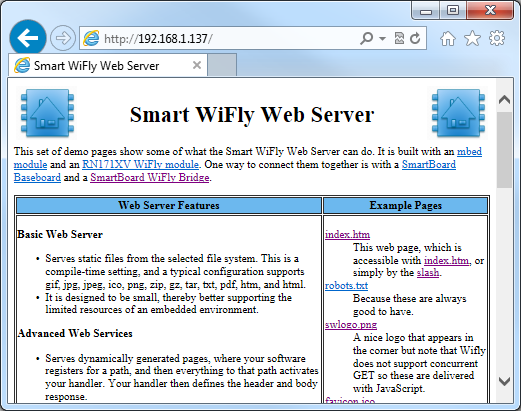 | Part of the main demo page, which basically has all the specifications, configurations, and limitations. |
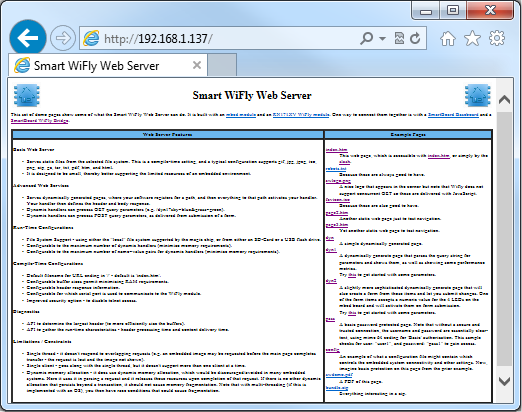 | A zoomed out view of the same page. |
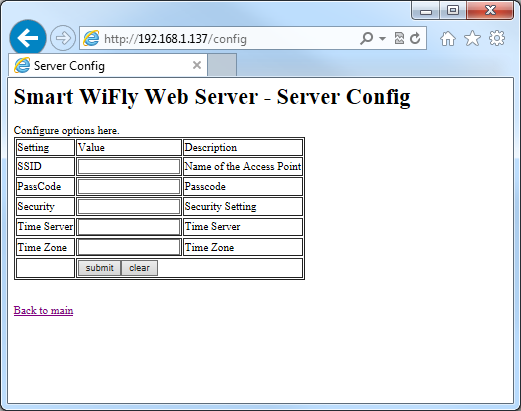 | It would be possible to configure the server via the web. |
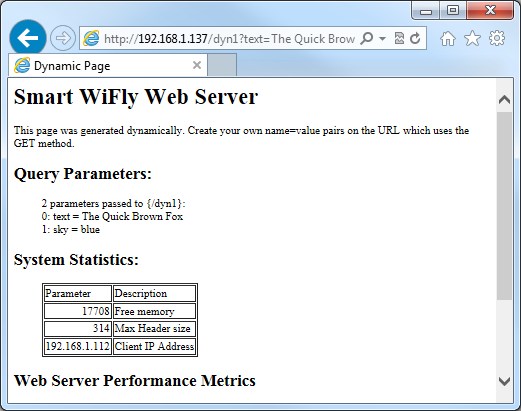 | One of the dynamically generated pages. This one has parsed the query parameters. |
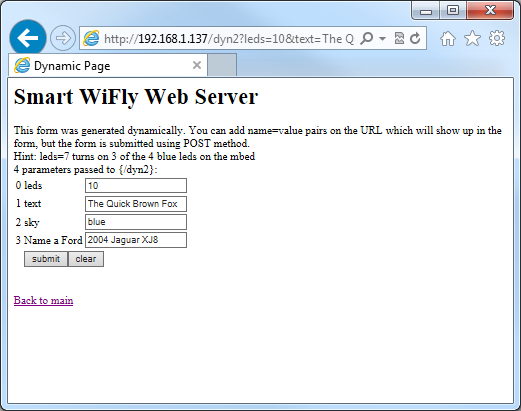 | A simple form which has a dynamic handler on the back end. Here it takes the value associated with "leds" and uses that to set the 4 LEDs on the mbed module. |
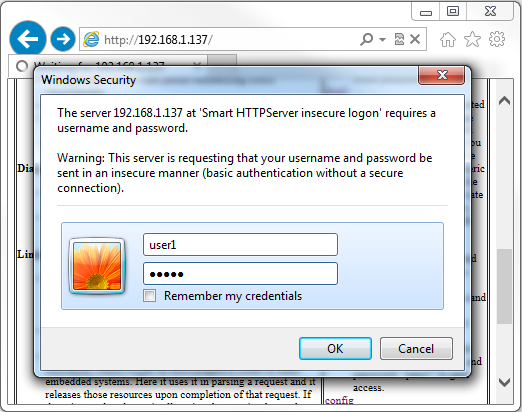 | A dynamic handler can require authentication. |
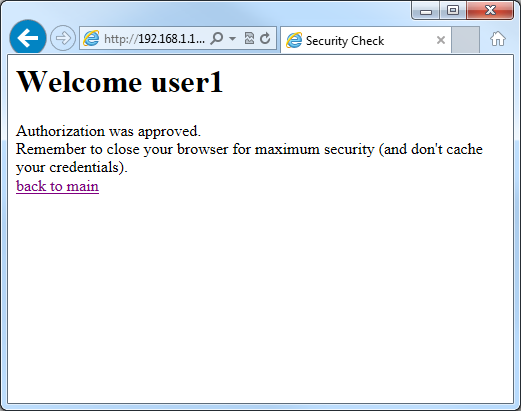 | Success! |
But I've now gone so far beyond that in the current version. Here's what this one can do:
- It serves static web pages from a file system. I've only tested with the local file system and an SD card, but should work for any, so long as you remember that the local file system can't read subdirectories.
- It can serve dynamically generated web pages. This lets you accept name=value pairs using the URL (using either a GET or POST method). It can also accept them from forms. The demo lets you control the 4 LEDs from a form.
- As safely as possible it retrieves your credentials to the Wi-Fi Access Point. After using them, it overwrites that ram so they can't be as easily extracted.
- I made a large number of changes to the Wifly driver. It had too short of a timeout and I found quite a number of optimizations for performance and robustness.
- I have the start on a security feature - you can configure a resource to require user credentials to access it. The browser typically provides a username and password dialog. Take care however, as it does not support a secure (https) connection, so the credentials are not as securely transferred as I would like.
Optimizations I'd like to do:
- speed it up - I'm running the mbed to wifly module interface at 230K, which is about the top speed w/o flow control. There are other places where some time delays remain - I have eliminated a number of them.
- make it non-blocking, so other work can happen.
- integrate it with the rtos
- When a web page has referenced resources (e.g. an image tag), it rarely loads the image on the first try. I think the request for the resource comes in while it is still in the WiflyInterface cleaning up from the last connection. The Wifly module supports only a single connection at a time. I worked around this with a small bit of javascript to load the images after the web page.
But all in all I think it is a good start.
Program prerequisite
Here's the link to the program, but when you open it up, note a few very important items.
- Port Numbers listed in the constructor match the SmartBoard Baseboard.
- I sped up the communication baud rate to the mbed from the default 9600. Match your terminal program accordingly.
- Download this zip. Place it and an unzipped copy into the mbed local file system. These are the demo files.
- The typical ssid and password are not shown. See below to set yours.
ssid and password
You need to create a simple text file on your mbed root folder named "config.ini". The easiest way perhaps is to create "config.txt", add the information shown below and then rename it. This will be read at startup to connect you to the network. Something quite simple, like this:
[Wifi] ssid=your_ssid pass=your_pass_code
The program
And the program.
Import programSmart-WiFly-WebServer
A sample program demonstrating a small but powerful web server using the Wifly module. This uses several libraries from others, but has a custom version of the WiflyInterface library, with numerous improvement to the mbed standard library.
Revision 33:41ac99847df8, committed 2014-01-03
- Comitter:
- WiredHome
- Date:
- Fri Jan 03 19:57:31 2014 +0000
- Parent:
- 32:34dae3cae1b0
- Child:
- 34:77d0f63f612a
- Child:
- 35:87d3577800dc
- Commit message:
- Ongoing changes are working on supporting file upload.
Changed in this revision
--- a/Credentials.cpp Thu Nov 28 18:22:32 2013 +0000
+++ b/Credentials.cpp Fri Jan 03 19:57:31 2014 +0000
@@ -22,11 +22,11 @@
{
FILE *fp = fopen(file, "r");
- cr->ssid = (char *)malloc(CREDENTIAL_SIZE);
- cr->pass = (char *)malloc(CREDENTIAL_SIZE);
+ cr->ssid = (char *)malloc(SSID_SIZE);
+ cr->pass = (char *)malloc(PASS_SIZE);
if (fp) {
- fgets(cr->ssid, CREDENTIAL_SIZE, fp);
- fgets(cr->pass, CREDENTIAL_SIZE, fp);
+ fgets(cr->ssid, SSID_SIZE, fp); // Trusts that the sizes were not violated
+ fgets(cr->pass, PASS_SIZE, fp);
fclose(fp);
RTrim(cr->ssid);
RTrim(cr->pass);
@@ -39,9 +39,11 @@
void FreeCredentials(credentials * cr)
{
// first secure them by wiping them out
- for (int i=0; i<CREDENTIAL_SIZE; i++) {
- cr->ssid[i] = cr->pass[i] = '*';
- }
+ for (int i=0; i<SSID_SIZE; i++)
+ cr->ssid[i] = '*';
+ for (int i=0; i<PASS_SIZE; i++)
+ cr->pass[i] = '*';
+
// then free the memory
free(cr->ssid);
free(cr->pass);
--- a/Credentials.h Thu Nov 28 18:22:32 2013 +0000
+++ b/Credentials.h Fri Jan 03 19:57:31 2014 +0000
@@ -15,7 +15,9 @@
char * pass;
} credentials;
-#define CREDENTIAL_SIZE 50
+// Size changed (from 50 for both) to comply with WiFi Specifications
+#define SSID_SIZE 30
+#define PASS_SIZE 64
/** Read credentials from a file.
*
--- a/Examples/DynamicFileIn.cpp Thu Nov 28 18:22:32 2013 +0000
+++ b/Examples/DynamicFileIn.cpp Fri Jan 03 19:57:31 2014 +0000
@@ -1,37 +1,267 @@
/// Demonstration of dynamic page creation using the Smartware Web Server
///
/// Here is a sample for file upload.
-
#include "SW_HTTPServer.h"
#include "DynamicFileIn.h"
+
+#define DEBUG "File"
#include "Utility.h"
+// This defines the size of the largest file you are willing to accept
+//
+#define ACCEPT_MAX_BYTES (25000)
+
+// This defines the local cache, which should be about 2 x the size of a single chunk hand-off
+// which is based on the size of an ethernet data frame (~1500 bytes). So 2 x 1500 is a good number.
+#define ETHER_CHUNK (1500)
+#define PCACHE_SIZE (3000)
+#define MAX_BOUNDARY_LEN (150) // Seems very generous...
+static int bytesInCache;
+static char * pCache;
+static char * boundary = ""; // for pointing at the boundary marker part of multipart/form-data in pCache
+static char * fqfn = NULL; // for the filepath/filename
+static char * contenttype = NULL; // for "text/plain", or "image/bmp"
+static int bytesWritten;
+
+static int FileSize(const char * dir, const char * filename);
+static char _tolower(char c);
+static int _strnicmp(const char * left, const char * right, int len);
+static char * _stristr(char * pHaystack, const char * pNeedle);
+static char * _strnbin(char * pBinstack, const char *pNeedle, int len);
+
typedef enum {
IDLE,
ACCEPTED,
REJECTED_TOO_LARGE
} AcceptStatus;
+//
+//-----------------------------7de3ab1652086c
+//Content-Disposition: form-data; name="InFile"; filename="Len0700.txt"
+//Content-Type: text/plain
+//
+//__1 - _50 12345678901234567890123456789012345678
+//_51 - 100 12345678901234567890123456789012345678
+//101 - 150 12345678901234567890123456789012345678
+//151 - 200 12345678901234567890123456789012345678
+//201 - 250 12345678901234567890123456789012345678
+//251 - 300 12345678901234567890123456789012345678
+//301 - 350 12345678901234567890123456789012345678
+//351 - 400 12345678901234567890123456789012345678
+//401 - 450 12345678901234567890123456789012345678
+//451 - 500 12345678901234567890123456789012345678
+//501 - 550 12345678901234567890123456789012345678
+//551 - 600 12345678901234567890123456789012345678
+//601 - 650 12345678901234567890123456789012345678
+//651 - 700 12345678901234567890123456789012345678
+//
+//-----------------------------7de3ab1652086c--
+//^^ Boundary Definition ^^ Boundary Definition
+// is appended to "--" is suffixed "--" indicating the end.
+//---
+//Content-Disposition: form-data; name="InFile"; filename="somefile.txt"\r\n
+//Content-Type: image/bmp\r\n
+//\r\n
+//BM6.... (where the ... is purely binary data data)
+//\r\n------webKitFormBoundary9A3C872FAC9BE23--\r\n
+//---
+//
+HTTPServer::CallBackResults ProcessCache(HTTPServer *svr, HTTPServer::CallBackType type)
+{
+ typedef enum {
+ Seeking_Boundary_Start,
+ Seeking_Filename,
+ Seeking_ContentType,
+ Seeking_Data
+ } EF_State_E;
+ static EF_State_E EF_State = Seeking_Boundary_Start;
+ static FILE * fp = NULL;
+
+ char * pDataStart = pCache; // start of data in this transaction
+ char * pDataEnd = pCache + bytesInCache; // end of data in this transaction
+ char * pDBLcrlf;
+ char *p1, *p2, *p3; // general purpose pointer for processing the results
+ HTTPServer::CallBackResults ret = HTTPServer::ACCEPT_CONTINUE;
+
+ INFO("### Cache Begin\r\n%s\r\n### Cache End", pCache);
+ if (EF_State == Seeking_Boundary_Start) {
+ pDBLcrlf = _strnbin((char *)pDataStart, "\r\n\r\n", pDataEnd - pDataStart); // find end of preamble
+ if (pDBLcrlf) {
+ p1 = _strnbin((char *)pDataStart, boundary, pDBLcrlf - pDataStart); // is there a boundary in the cache?
+ if (p1) {
+ EF_State = Seeking_Filename;
+ }
+ }
+ }
+
+ if (EF_State == Seeking_Filename) {
+ pDBLcrlf = _strnbin((char *)pDataStart, "\r\n\r\n", pDataEnd - pDataStart); // find end of preamble
+ if (pDBLcrlf) {
+ p2 = _strnbin((char *)pDataStart, "Content-Disposition: ", pDBLcrlf - pDataStart); // and the filename container?
+ if (p2) {
+ p2 = _strnbin((char *)p2, "filename=\"", pDBLcrlf - pDataStart);
+ if (p2) { // found filename
+ p2 += strlen("filename=\""); // start of filename
+ p3 = strchr(p2, '"'); // end of filename
+ if (p3) {
+ *p3 = '\0';
+ fqfn = (char *)malloc(p3-p2 + strlen(svr->GetWebRoot())+2);
+ if (fqfn) {
+ strcpy(fqfn, svr->GetWebRoot()); // We could put it elsewhere
+ strcat(fqfn, "/");
+ strcat(fqfn, p2);
+ *p3 = '"'; // Put this back so we can print the cache
+ EF_State = Seeking_ContentType;
+ pDataStart = p3 + 1;
+ } else {
+ ERR("Failed to allocate space for filename");
+ ret = HTTPServer::ACCEPT_ERROR;
+ EF_State = Seeking_Boundary_Start;
+ bytesInCache = 0;
+ return ret;
+ }
+ }
+ }
+ }
+ }
+ }
+
+ if (EF_State == Seeking_ContentType) {
+ pDBLcrlf = _strnbin((char *)pDataStart, "\r\n\r\n", pDataEnd - pDataStart); // find end of preamble
+ if (pDBLcrlf) {
+ p2 = _strnbin((char *)pDataStart, "Content-Type: ", pDBLcrlf - pDataStart);
+ if (p2) {
+ p2 += strlen("Content-Type: ");
+ p3 = strchr(p2, '\r');
+ if (p3) {
+ *p3 = '\0';
+ contenttype = (char *)malloc(p3-p2 + 2);
+ if (contenttype) {
+ strcpy(contenttype, p2);
+ *p3 = '\r'; // put it back so we can print the cache
+ } else {
+ ERR("Failed to allocate space for content type");
+ ret = HTTPServer::ACCEPT_ERROR;
+ EF_State = Seeking_Boundary_Start;
+ bytesInCache = 0;
+ return ret;
+ }
+ pDataStart = pDBLcrlf + 4; // Advance to the actual data
+ EF_State = Seeking_Data;
+ }
+ }
+ }
+ }
+
+ if (EF_State == Seeking_Data) {
+ if (!fp && fqfn) {
+ //INFO("Open file [%s]", fqfn);
+ fp = fopen(fqfn, "w");
+ if (!fp) {
+ ERR("failed to open [%s]", fqfn);
+ free(fqfn);
+ fqfn = NULL;
+ if (contenttype) {
+ free(contenttype);
+ contenttype = NULL;
+ }
+ ret = HTTPServer::ACCEPT_ERROR;
+ return ret;
+ }
+ }
+ if (fp) {
+ Timer t;
+ // The file is open, so we're writing data to it.
+ // We do this until we find the ending boundary, but we may not have the [whole]
+ // ending boundary in the cache yet.
+ p1 = _strnbin((char *)pDataStart, boundary, pDataEnd - pDataStart); // is there a boundary in the cache?
+ if (p1) { // if we find the ending boundary, we can truncate and write the data ahead of the boundary
+ p1 -= 4; // Actual ending boundary is "\r\n--" + "boundary" + "--", so back up 4.
+ *p1 = '\0';
+ pDataEnd = p1;
+ if (pDataEnd > pDataStart) {
+ bytesWritten += pDataEnd - pDataStart;
+ t.start();
+ fwrite(pDataStart, 1, pDataEnd - pDataStart, fp);
+ INFO("Writing %5d bytes, %5d total written, (reserve %d) in %d us",
+ pDataEnd - pDataStart, bytesWritten, 0, t.read_us());
+ //INFO("Write: %s***", pDataStart);
+ bytesInCache = 0;
+ *pCache = '\0'; // this for debugging in case it is text and you want to print it.
+ } else {
+ INFO("Not enough data to write (%d <= %d)", pDataEnd, pDataStart);
+ }
+ } else { // didn't find the boundary, but it might be partially there...
+ // write the data, but not the last (strlen(boundary) + 4)
+ // in case this transaction has some, but not all of the boundary
+ int reserve = strlen(boundary) + 4;
+ pDataEnd -= reserve;
+ if (pDataEnd > pDataStart) {
+ bytesWritten += pDataEnd - pDataStart;
+ t.start();
+ fwrite(pDataStart, 1, pDataEnd - pDataStart, fp);
+ INFO("Writing %5d bytes, %5d total written, (reserve %d) in %d us",
+ pDataEnd - pDataStart, bytesWritten, reserve, t.read_us());
+ //INFO("Write: %s###", pDataStart);
+ memcpy(pCache, pDataEnd, reserve+1); // copies the trailing '\0'
+ bytesInCache = reserve;
+ //*(pCache + bytesInCache) = '\0';
+ INFO("remaining: %s", pCache);
+ } else {
+ INFO("Not enough data to write (%d <= %d)", pDataEnd, pDataStart);
+ }
+ }
+ ret = HTTPServer::ACCEPT_CONTINUE;
+ }
+ }
+
+ if (type == HTTPServer::DATA_TRANSFER_END) {
+ if (fp) {
+ fclose(fp);
+ fp = NULL;
+ if (fqfn) {
+ free(fqfn);
+ fqfn = NULL;
+ }
+ if (contenttype) {
+ free(contenttype);
+ contenttype = NULL;
+ }
+ }
+ if (pCache) {
+ //INFO("pCache - freed");
+ free(pCache);
+ pCache = NULL;
+ bytesInCache = 0;
+ }
+ ret = HTTPServer::ACCEPT_COMPLETE;
+ }
+ return ret;
+}
+
+
+
/// DynamicFileIn
///
/// This page lets you submit a file.
///
/// You can see in main how this page was registered.
///
-HTTPServer::CallBackResults DynamicFileIn(HTTPServer *svr, HTTPServer::CallBackType type, const char * path, const HTTPServer::namevalue *params, int paramcount)
+HTTPServer::CallBackResults DynamicFileIn(
+ HTTPServer *svr,
+ HTTPServer::CallBackType type,
+ const char * path,
+ const HTTPServer::namevalue *params,
+ int count)
{
char buf[100];
int clSize; // content-length size to be transferred
- char * p1; // general purpose pointer for processing the results
- char * p2; // general purpose pointer for processing the results
- static char * boundary = ""; // for pointing at the boundary marker part of multipart/form-data
static AcceptStatus accept = IDLE;
HTTPServer::CallBackResults ret = HTTPServer::ACCEPT_ERROR;
DIR *d;
struct dirent *p;
switch (type) {
-
case HTTPServer::CONTENT_LENGTH_REQUEST:
// Here we can find out how much data is headed our way,
// and choose to accept or reject it.
@@ -41,84 +271,71 @@
// also, for the multipart data, we have to learn and track
// the boundary sequence, so we can parse the big block
// successfully.
- boundary = strstr((char *)svr->GetHeaderValue("Content-Type"), "boundary=");
+ boundary = _stristr((char *)svr->GetHeaderValue("Content-Type"), "boundary=");
if (boundary)
boundary += strlen("boundary=");
+ //INFO("C-Len: %d, boundary: [%s]", clSize, boundary);
//printf("InFile = [%s]\r\n", svr->GetHeaderValue("InFile"));
// If we're happy with the size, and we have the boundary marker we need
- if (clSize < 3000 && boundary) { // arbitrarily chosen size to accept
- accept = ACCEPTED;
- ret = HTTPServer::ACCEPT_COMPLETE;
+ if (clSize < ACCEPT_MAX_BYTES && boundary) {
+ pCache = (char *)malloc(PCACHE_SIZE);
+ if (pCache) {
+ //INFO("pCache - allocated");
+ bytesInCache = 0;
+ accept = ACCEPTED;
+ ret = HTTPServer::ACCEPT_COMPLETE;
+ } else {
+ accept = REJECTED_TOO_LARGE; // can't get the RAM to host the stream
+ ret = HTTPServer::ACCEPT_ERROR;
+ }
} else {
accept = REJECTED_TOO_LARGE;
}
break;
+ case HTTPServer::DATA_TRANSFER_END:
+ //INFO("\r\n\\\\\\\\\\\\ Transfer Begin [%d, %d]\r\n%s\r\n////// Transfer End", count, bytesInCache, path);
+ // if there is anything there, copy it in.
+ if (count) {
+ memcpy(pCache + bytesInCache, path, count);
+ bytesInCache += count;
+ pCache[bytesInCache] = '\0'; // one past the data, so ok (and good for debugging text streams)
+ }
+ ret = ProcessCache(svr, type);
+ break;
+
case HTTPServer::DATA_TRANSFER:
- // Here's the big blob of data. We've got some painful work here.
- // The blob looks kind of like this:
- //---
- //Content-Disposition: form-data; name="InFile"; filename="somefile.txt"\r\n
- //Content-Type: text/plain\r\n
- //\r\n
- //Text in the file starts here\r\n
- //and continues as needed.
- //------webKitFormBoundary9A3C872FAC9BE23--\r\n
- //---
- // So, we'll work our way thru by extracting the filename, we'll
- // assume it is text/plain, as in this example.
- // If all looks well, we'll write it to the local file system,
- // and return true.
- printf("Data Transfer\r\n");
- p1 = strchr((char *)path, '\r');
- if (p1) {
- p2 = strstr((char *)path, "filename=\"");
- if (p2) {
- p2 += strlen("filename=\"");
- p1 = strchr(p2, '"');
- if (p1) {
- char * fn = p2;
- *p1 = '\0';
- p1 = strstr(p1+1, "\r\n\r\n");
- if (p1) {
- p1 += 4; // finally, sitting on the start of the file data
- p2 = strstr(p1, boundary); // find the end
- if (p2) {
- // now, create the file
- FILE * fp;
- *p2 = '\0';
- strcpy(buf, svr->GetWebRoot());
- strcat(buf, "/");
- strcat(buf, fn);
- printf("Writing to [%s]\r\n", buf);
- fp = fopen(buf, "w");
- if (fp) {
- printf("writing data...\r\n");
- fwrite(p1, 1, p2 - p1, fp);
- fclose(fp);
- printf("done.\r\n");
- ret = HTTPServer::ACCEPT_COMPLETE;
- } else {
- printf("failed to open [%s]\r\n", buf);
- }
- }
- }
- }
- }
+ //INFO("\r\n\\\\\\\\\\\\ Transfer Begin [%d, %d]\r\n%s\r\n////// Transfer End", count, bytesInCache, path);
+ // We chose to accept the transfer, and it may come in chunks.
+ if (bytesInCache + count < PCACHE_SIZE - ETHER_CHUNK) { // room in the cache for more, juat accept it locally
+ memcpy(pCache + bytesInCache, path, count);
+ bytesInCache += count;
+ pCache[bytesInCache] = '\0'; // one past the data, so ok (and good for debugging text streams)
+ ret = HTTPServer::ACCEPT_CONTINUE;
+ } else if (bytesInCache + count < PCACHE_SIZE) { // room in the cache, now process it.
+ memcpy(pCache + bytesInCache, path, count);
+ bytesInCache += count;
+ pCache[bytesInCache] = '\0'; // one past the data, so ok (and good for debugging text streams)
+ ret = ProcessCache(svr, type); // now hand it off
+ } else {
+ ret = ProcessCache(svr, type); // panic, ah!, ok, first hand it off then cache it
+ memcpy(pCache + bytesInCache, path, count);
+ bytesInCache += count;
+ pCache[bytesInCache] = '\0'; // one past the data, so ok (and good for debugging text streams)
+ ERR("FATAL - didn't flush pCache, was about to be overrun");
+ break;
}
- ret = HTTPServer::ACCEPT_COMPLETE;
break;
-
+
case HTTPServer::SEND_PAGE:
- // send the header
- //printf("Sending page\r\n");
svr->header(200, "OK", svr->GetSupportedType(".htm"));
- // send some data
svr->send("<html><head><title>Dynamic File Submit</title></head>\r\n");
svr->send("<body>\r\n");
svr->send("<h1>Smart WiFly Web Server</h1>\r\n");
- svr->send("This example permits you to upload a small file. Select the file using ");
- svr->send("the normal form gadget and submit it.");
+ sprintf(buf, "This example permits you to upload a file of not more than %d bytes. ", ACCEPT_MAX_BYTES);
+ svr->send(buf);
+ svr->send("If the file is one of the supported types, you can then download it too. ");
+ svr->send("Select the file using the form gadget and then submit it.");
switch(accept) {
case IDLE:
default:
@@ -131,31 +348,38 @@
break;
}
// note that to accept a file, the form enctype is multipart/form-data.
+ svr->send("<blockquote>\r\n");
sprintf(buf, "<form method='post' enctype='multipart/form-data' action='%s'>\r\n", path);
svr->send(buf);
- svr->send("<table border='1'>\r\n");
- svr->send("<tr><td> </td><td>File</td><td><input type='file' name='InFile' size='40'></td></tr>\r\n");
- svr->send("<tr><td> </td><td colspan='2'><input type='submit' value='submit'><input type='reset' value='clear'></td></tr>\r\n");
+ svr->send("<table border='0'>\r\n");
+ svr->send("<tr><td>File</td><td><input type='file' name='InFile' size='60'></td></tr>\r\n");
+ svr->send("<tr><td> </td><td><input type='submit' value='Submit'><input type='reset' value='Clear'></td></tr>\r\n");
svr->send("</table>\r\n");
svr->send("</form>\r\n");
+ svr->send("</blockquote>\r\n");
#if 1
- sprintf(buf, "Directory of [%s]:<br/>\r\n", svr->GetWebRoot());
+ sprintf(buf, "<h2>Directory of [%s]:</h2>\r\n", svr->GetWebRoot());
svr->send(buf);
d = opendir(svr->GetWebRoot());
if ( d != NULL ) {
+ svr->send("<ul>\r\n");
while ( (p = readdir(d)) != NULL ) {
- sprintf(buf, " - %s<br/>\r\n", p->d_name);
+ if (svr->GetSupportedType(p->d_name) != NULL)
+ sprintf(buf, "<li><a href='%s'>%s</a> (%d bytes)</li>\r\n", p->d_name, p->d_name, FileSize(svr->GetWebRoot(), p->d_name)); // only supported types linked
+ else
+ sprintf(buf, "<li>%s (%d bytes)</li>\r\n", p->d_name, FileSize(svr->GetWebRoot(), p->d_name)); // We could skip/hide these if that makes more sense
svr->send(buf);
}
+ svr->send("</ul>\r\n");
closedir(d);
} else {
svr->send("Unable to open directory!");
}
#endif
- svr->send("<br/><a href='/'>Back to main</a></body></html>\r\n");
+ svr->send("<a href='/'>Back to main</a></body></html>\r\n");
ret = HTTPServer::ACCEPT_COMPLETE;
break;
-
+
default:
printf("unknown command %d\r\n", type);
ret = HTTPServer::ACCEPT_ERROR;
@@ -164,4 +388,82 @@
return ret;
}
+static int FileSize(const char * dir, const char * filename)
+{
+ int size = 0;
+ char * fqfn = (char *)malloc(strlen(dir) + strlen(filename) + 2);
+ if (fqfn) {
+ strcpy(fqfn, dir);
+ strcat(fqfn, "\\");
+ strcat(fqfn, filename);
+ FILE * f = fopen(fqfn,"r");
+ if (f) {
+ fseek(f, 0, SEEK_END); // seek to end of file
+ size = ftell(f);
+ fclose(f);
+ }
+ }
+ return size;
+}
+// very simple ASCII only function to convert
+// UPPERCASE to lowercase.
+//
+static char _tolower(char c)
+{
+ if (c >= 'A' && c <= 'Z')
+ c = c - 'A' + 'a';
+ return c;
+}
+
+// case insensitive compare
+static int _strnicmp(const char * left, const char * right, int len)
+{
+ if (!left || !right)
+ return 0; // actually, can't compare so this is a small lie
+ while (len) {
+ if (_tolower(*left) < _tolower(*right))
+ return -1;
+ else if (_tolower(*left) > _tolower(*right))
+ return 1;
+ left++;
+ right++;
+ len--;
+ }
+ return 0; // match
+}
+
+// Search a haystack string for a needle string - case insensitive.
+//
+static char * _stristr(char * pHaystack, const char * pNeedle)
+{
+ if (!pHaystack || !*pHaystack || !pNeedle || !*pNeedle)
+ return NULL; // bad params
+ while (*pHaystack) {
+ if (_strnicmp(pHaystack, pNeedle, strlen(pNeedle)) == 0)
+ return pHaystack;
+ pHaystack++;
+ }
+ return NULL;
+}
+
+// Search the [possibly] binary haystack for the Needle, which is a string.
+// This is used to find the 'boundary' marker in a stream from the network
+// interface. The contents between the boundary markers could be text, or
+// it could be a binary stream. Since the haystack could be binary, we need
+// to control the search by a length parameter.
+//
+static char * _strnbin(char * pBinstack, const char *pNeedle, int len)
+{
+ char * pLast;
+ if (!pBinstack || !pNeedle || !*pNeedle || len == 0)
+ return NULL; // bad params
+ len -= strlen(pNeedle); // only search [most] of the haystack
+ pLast = pBinstack + len;
+ while (pBinstack <= pLast) {
+ if (_strnicmp(pBinstack, pNeedle, strlen(pNeedle)) == 0)
+ return pBinstack;
+ pBinstack++;
+ }
+ return NULL;
+}
--- a/Examples/ServerConfig.cpp Thu Nov 28 18:22:32 2013 +0000
+++ b/Examples/ServerConfig.cpp Fri Jan 03 19:57:31 2014 +0000
@@ -33,10 +33,10 @@
char security[10] = "";
char timeserver[60] = "";
char timezone[4] = ""; // -12
- char *securityList[] =
- { "NONE", "WEP_128", "WPA1", "WPA", "WPA2_PSK", "n/a", "ADHOC", "n/a", "WPE_64" };
+ //char *securityList[] =
+ // { "NONE", "WEP_128", "WPA1", "WPA", "WPA2_PSK", "n/a", "ADHOC", "n/a", "WPE_64" };
INI ini("/local/config.ini");
-
+
switch (type) {
case HTTPServer::SEND_PAGE:
// svr->GetParameter("SSID");
--- a/IniManager.lib Thu Nov 28 18:22:32 2013 +0000 +++ b/IniManager.lib Fri Jan 03 19:57:31 2014 +0000 @@ -1,1 +1,1 @@ -http://mbed.org/users/WiredHome/code/IniManager/#c63a794c1fee +http://mbed.org/users/WiredHome/code/IniManager/#64fcaf06b012
--- a/SW_HTTPServer.lib Thu Nov 28 18:22:32 2013 +0000 +++ b/SW_HTTPServer.lib Fri Jan 03 19:57:31 2014 +0000 @@ -1,1 +1,1 @@ -http://mbed.org/users/WiredHome/code/SW_HTTPServer/#8f72be717a3c +http://mbed.org/users/WiredHome/code/SW_HTTPServer/#ef165a67ab22
--- a/Utility/Utility.h Thu Nov 28 18:22:32 2013 +0000
+++ b/Utility/Utility.h Fri Jan 03 19:57:31 2014 +0000
@@ -13,4 +13,23 @@
extern "C" void mbed_reset();
+// How to use this debug macro
+//
+// #define DEBUG "myfile"
+// #include "Utility.h"
+// ...
+// INFO("Stuff to show %d", var); // new-line is automatically appended
+// [I myfile 23] Stuff to show 23\r\n
+//
+#if (defined(DEBUG) && !defined(TARGET_LPC11U24))
+#define INFO(x, ...) std::printf("[INF %s %3d] "x"\r\n", DEBUG, __LINE__, ##__VA_ARGS__);
+#define WARN(x, ...) std::printf("[WRN %s %3d] "x"\r\n", DEBUG, __LINE__, ##__VA_ARGS__);
+#define ERR(x, ...) std::printf("[ERR %s %3d] "x"\r\n", DEBUG, __LINE__, ##__VA_ARGS__);
+#else
+#define INFO(x, ...)
+#define WARN(x, ...)
+#define ERR(x, ...)
+#endif
+
+
#endif // UTILITY_H
--- a/WiflyInterface.lib Thu Nov 28 18:22:32 2013 +0000 +++ b/WiflyInterface.lib Fri Jan 03 19:57:31 2014 +0000 @@ -1,1 +1,1 @@ -http://mbed.org/users/WiredHome/code/WiflyInterface/#a4831b1cb9a4 +http://mbed.org/users/WiredHome/code/WiflyInterface/#0729959263b7
--- a/main.cpp Thu Nov 28 18:22:32 2013 +0000
+++ b/main.cpp Fri Jan 03 19:57:31 2014 +0000
@@ -1,22 +1,22 @@
/** @file main.cpp contains the main program that a user would write.
* see the documentation above "main"
*/
-#include "mbed.h" // ver 70
+#include "mbed.h" // ver 75
// Standard components
#include "MODSERIAL.h" // ver 32 of Erik Olieman's derivative from Andy Kircham
// My components
#include "Utility.h" // a couple of simple helper functions
-#include "WiflyInterface.h" // ver 51, derived from version 4 with my mods
+#include "WiflyInterface.h" // ver 53, derived from mbed official ver 4
#include "SW_HTTPServer.h" // ver 31, derived from nweb
#include "Credentials.h" // ver 0, credential manager
#include "DynamicPages.h" // my dynamically generated pages
#include "SecurePage.h" // my secure pages
#include "ServerConfig.h" // various configuration options
#include "DynamicFileIn.h" // Upload a file to the server
-#include "MSCFileSystem.h" //
-#include "SDFileSystem.h" // ver 2, standard
+#include "MSCFileSystem.h" // ver 1, this and SDFileSystem
+#include "SDFileSystem.h" // ver 1, this and MSCFileSystem
#define HTTP_SERVER_PORT 80
@@ -28,7 +28,7 @@
LocalFileSystem local("local"); // some place to hold settings and maybe the static web pages
-MSCFileSystem msc("msc");
+MSCFileSystem msc("msc"); // Mass Storage on USB
SDFileSystem sd(p5, p6, p7, p8, "sd"); // for the static web pages
#define WEBROOT "/msc/web"
@@ -130,10 +130,12 @@
/// @li I would like it to be faster (the interface from mbed to wifly is
/// limited to 230400 baud before it drops chars. HW handshake could
/// improve this, but the HW handshake pins on the LPC1768 are not
-/// brought out.
+/// both brought out.
/// @li I would like to integrate this with the rtos.
/// @li If a page has multiple components (e.g. images), it appears
/// unreliable. It doesn't see the request for the extra component.
+/// A poor workaround, for images, is to use a javascript to post-
+/// load them. This is fundamentally a constraint of the WiFly module.
///
/// history:
/// @li 20130602 added .txt to the supported types (e.g. robots.txt), so
@@ -155,7 +157,7 @@
{
credentials cr; // handles the credentials
- pc.baud(460800); // I like a snappy terminal, so crank it up!
+ pc.baud(921600); // I like a snappy terminal, so crank it up!
pc.claim(); // capture stdout
pc.printf("\r\nSmart WiFly - Build " __DATE__ " " __TIME__ "\r\n");
@@ -165,15 +167,13 @@
error(" Waiting for user to fix this problem. \r\n"); // flash and die
}
- // Instantiate the WiflyInterface
- WiflyInterface wifly(p28, p27, p23, p24, cr.ssid, cr.pass, WPA);
- // Release the credentials, which also secures them
- FreeCredentials(&cr);
+ WiflyInterface wifly(p28, p27, p23, p24, cr.ssid, cr.pass, WPA); // Instantiate the WiflyInterface
+ FreeCredentials(&cr); // Release the credentials, which also secures them
// Bring the WiFly interface online
do {
wifly.init(); // start it up as a client of my network using DHCP
- wifly.baud(230400); // Only 230K w/o HW flow control
+ wifly.baud(921600); // Only 230K w/o HW flow control
if (wifly.connect())
break;
pc.printf(" Failed to connect, retrying...\r\n");
@@ -201,7 +201,7 @@
svr.RegisterHandler("/pass", SimpleSecurityCheck);
svr.RegisterHandler("/config", ServerConfig);
svr.RegisterHandler("/FileIn", DynamicFileIn);
-
+
// Let the human know it is ready - if they are watching
pc.printf("Connect to this server at http://%s:%d\r\n", wifly.getIPAddress(), HTTP_SERVER_PORT);
@@ -213,10 +213,9 @@
//pc.printf("Largest free mem block is %d\r\n", Free());
ShowSignOfLife();
}
- svr.Poll(); // non-blocking, but not deterministic
- //pc.printf("this %d, longest %d\r\n", thisRun, longestRun);
+ svr.Poll(); // non-blocking, but also not deterministic
if (pc.readable())
- WiFlyShell(wifly, pc);
+ WiFlyShell(wifly, pc); // allow shell access at runtime (if user taps a key)
}
}
--- a/mbed.bld Thu Nov 28 18:22:32 2013 +0000 +++ b/mbed.bld Fri Jan 03 19:57:31 2014 +0000 @@ -1,1 +1,1 @@ -http://mbed.org/users/mbed_official/code/mbed/builds/673126e12c73 \ No newline at end of file +http://mbed.org/users/mbed_official/code/mbed/builds/dc225afb6914 \ No newline at end of file
